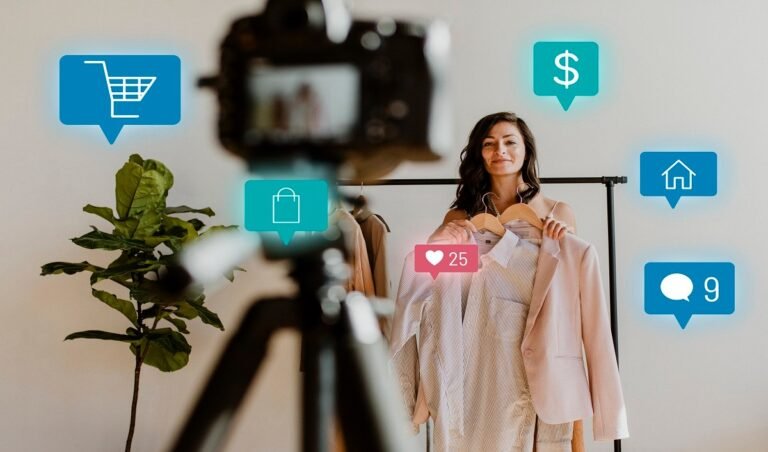
In today’s fast-paced digital world, social media influencers have emerged as key players in shaping the entertainment industry. What once was an industry dominated by traditional celebrities, filmmakers, and musicians, has now expanded to include a new breed of talent – influencers who rise to prominence through platforms like Instagram, YouTube, TikTok, and Twitter. These influencers, with their massive online followings and ability to engage with fans on a personal level, are redefining the landscape of entertainment.
In this article, we’ll explore how social media influencers are changing the entertainment industry and discuss their impact on various sectors, from advertising and brand partnerships to film, television, music, and more.
The Rise of Social Media Influencers
The term “social media influencer” refers to individuals who have built a large and dedicated following on platforms like Instagram, YouTube, TikTok, and Twitter. These influencers can range from beauty vloggers and fitness experts to gamers and comedians. What sets influencers apart from traditional celebrities is their ability to directly engage with their audience, often forming a personal connection that fans feel with the influencer.
According to a report by Influencer Marketing Hub, the influencer marketing industry is expected to reach $21.1 billion in 2023, illustrating just how much social media influencers have taken hold of modern marketing and entertainment. Platforms like Instagram and YouTube have given influencers the tools to connect with millions of people, and with that connection, comes the power to shape trends, influence buying habits, and even affect the direction of entertainment.
Influencers in Film and Television
Traditionally, film and television were primarily influenced by high-budget productions and established actors. However, the rise of influencers has created a new form of content production and distribution, with influencers stepping into the roles of actors, producers, and even directors. This shift has led to the development of digital-first content, which is often produced for social media platforms and streamed directly to fans.
One of the most notable examples of influencers transitioning into the film and television space is The D’Amelio Show. This reality series, which follows the lives of TikTok stars Charli and Dixie D’Amelio, was picked up by Hulu in 2021, showcasing how influencers can transition from social media stardom to major television deals. This shift has not only changed how television content is made, but also who gets to be on screen. The entertainment industry has become more inclusive, and people no longer need to follow traditional paths to stardom.
Social media influencers have also gained the attention of big Hollywood studios, leading to influencer cameos in blockbuster films. For instance, influencers like Liza Koshy and Zoe Sugg (Zoella) have made appearances in movies and TV shows. This reflects a changing dynamic where social media influencers are seen as legitimate sources of entertainment value and are brought into the fold of mainstream media production.
The Power of Social Media in Music
Another area where social media influencers are making waves is in the music industry. While mainstream music platforms like Spotify and Apple Music remain dominant, social media has become a key marketing tool for both new and established artists. Influencers on platforms like TikTok have the power to turn an unknown song into a global hit simply by using it in a video, which is often how viral songs like Lil Nas X’s “Old Town Road” gained popularity.
TikTok, in particular, has become a platform where music goes viral. Influencers share dance challenges, lip-sync videos, and creative content using the latest tracks, giving exposure to emerging artists. For instance, Olivia Rodrigo’s “drivers license” became a chart-topping success after gaining traction on TikTok, where influencers across the globe posted videos of themselves reacting to or creating content around the song.
In addition to driving music sales and streams, influencers are also impacting the way artists and record labels approach music releases. Collaborations between influencers and artists have become increasingly common, with social media personalities hosting album release events, conducting interviews, and even creating promotional content for artists’ songs. This has given influencers significant leverage in the music industry and solidified their status as entertainment influencers.
Brand Collaborations and Product Endorsements
The influence of social media personalities on consumer behavior is another major way influencers are impacting the entertainment industry. Influencers, who often endorse products or brands through sponsored posts and advertisements, have a profound effect on the way audiences engage with brands. In fact, some influencers have even launched their own products, creating personal brands that rival those of established corporations.
For instance, Kylie Jenner’s Kylie Cosmetics brand, which began as a social media phenomenon, has grown into a multi-million dollar business. Other influencers like James Charles (with his makeup line) and Emma Chamberlain (with her coffee brand) have followed suit, using their vast online platforms to market and sell their products. These types of brand partnerships not only impact consumer habits but also shift the way the entertainment industry views the power of an individual’s social media presence.
Additionally, influencers often collaborate with brands in ways that blur the lines between entertainment and advertising. For example, when an influencer creates a branded video, it feels more like content and entertainment rather than a traditional advertisement. This shift in how brands market to consumers has revolutionized advertising, making it more interactive, authentic, and tailored to specific audiences.
Redefining Celebrity Endorsements
The role of traditional celebrity endorsements has also been disrupted by the rise of influencers. In the past, companies would rely on high-profile celebrities to endorse products, but now, influencers with targeted niche followings can offer a more direct route to a specific demographic. This change in the celebrity endorsement model has allowed brands to leverage influencers who are highly engaged with their audiences, resulting in higher conversion rates and more authentic brand connections.
The #ad hashtag, which is commonly used by influencers to disclose paid promotions, has become a staple of influencer culture. This transparency in advertising has created a new level of authenticity for both influencers and brands, allowing fans to feel that the endorsements they see are coming from a genuine place. Influencers are seen as more relatable than traditional celebrities, and this relatability creates a stronger emotional connection between influencers and their followers.
Influencers Shaping Social Movements
Social media influencers aren’t just limited to entertainment and marketing—they’ve also become powerful voices in social movements. From raising awareness about mental health and climate change to advocating for racial justice, influencers have used their platforms to bring attention to important causes. Many have utilized their vast following to inspire change, push for progress, and raise funds for various philanthropic efforts.
For example, Emma Chamberlain has spoken openly about her struggles with mental health, and Lilly Singh has used her platform to promote diversity and inclusivity in the entertainment industry. These efforts are shifting the power dynamics in entertainment by giving influencers the platform to advocate for issues that traditional celebrities may not have addressed as openly or directly.
The Future of Influencers in Entertainment
As the influence of social media personalities continues to grow, it’s clear that influencers will play a significant role in the future of entertainment. We can expect more collaborations between influencers and established entertainment industries, leading to new forms of content creation and distribution. The rise of virtual influencers—computer-generated personalities—also poses interesting questions about the future of celebrity and entertainment, and how much of entertainment will be driven by artificial personalities.
In the coming years, influencers will likely continue to expand their impact across film, music, fashion, and beyond. Traditional media outlets and entertainment companies will need to adapt to this new era of entertainment, finding ways to collaborate with influencers in order to stay relevant in an increasingly digital world.
Conclusion
Social media influencers have fundamentally changed the entertainment industry in several key ways: from creating viral music hits and redefining traditional celebrity endorsements to giving voice to social justice movements and blurring the lines between content creation and advertising. In 2025, influencers are not just digital stars—they are shaping the future of how we consume entertainment, interact with brands, and even connect with one another.
As social media platforms continue to evolve, influencers will undoubtedly remain at the forefront of this transformation, continually reshaping the entertainment industry for years to come. The entertainment world is now more inclusive, diverse, and interactive, thanks to the rise of influencers, and as their influence grows, so too will the impact they have on entertainment, advertising, and culture.




